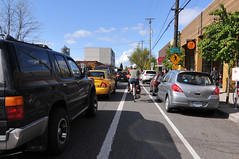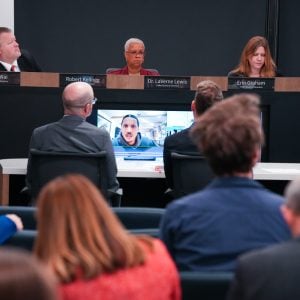A report released last night (PDF here) on the April 16th open house for the North Williams Traffic Safety Operations Project shows that, after hearing overwhelming support from the community, PBOT and their project team will further consider reducing Williams to one lane for motor vehicle traffic in the commercial district between known as Segment 4.
PBOT project manager Ellen Vanderslice told us via email today that, “Based on the public input we’ve received, the project team is investigating options for N Williams that would convert a traffic lane in Segment 4.”
PBOT surprised many in the community by showing up at the first open house with the commercial district between N Cook and Skidmore as the only segment of the project where an existing vehicle lane wouldn’t be re-allocated to make room for an “enhanced bikeway.”
While it’s far from a done deal, Vanderslice says making Williams into one lane for motor vehicles will receive further consideration both from PBOT engineers and project consultants.
At the open house, attendees made it clear that they wanted the City to put that option back on the table. Here’s an excerpt from the report:
“The choice to not convert parking or motor vehicle travel lanes in Segment 4 was the single most popular comment at the workshop and also created significant discussion on local bicycling blogs.”
Also notable, in terms of what type of bikeway will end up being built on Williams, is that a large majority of open house attendees put their support behind a separated cycle track.
Asked what type of bikeway options they support, 120 out of 194 respondents voted for the cycle track because it would provide the most separation, would help minimize bus/bike and dooring conflicts, and because it could handle bike traffic capacity. (Other options receiving votes were “leave the street as is” with 21 votes and “enhanced/buffered bikeway” with 53 votes.)
Another takeaway form the open house, according to the report, was a “high level of discussion about the potential for North Williams Avenue to become a “platinum level” bikeway.” Among the ideas that were popular at the open house that “will be further considered by the project team” are (emphasis mine):
- Reducing the width of motor vehicle travel lanes between Weidler Street and Broadway and using the additional space to develop a dual-lane bikeway. This option provides an opportunity for faster cyclists to pass slower cyclists and when not in use the additional lane provides a buffer from motor vehicle traffic. This also allows three northbound vehicle lanes to be maintained.
- Converting a motor vehicle travel lane in the commercial district (Segment 4) to provide an enhanced bikeway and applying peak hour parking restrictions on one side of the street to create two motor vehicle travel lanes during the busiest times.
- Instead of an advisory bike lane in Segment 4, adding shared lane markings (SLM’s) in the adjacent travel lane as an option for bicycling outside the door zone. In addition, bicyclists and motorists are more familiar with the meaning of SLM’s compared to an advisory bike lane.
- Consider a shared bus/bike lane to reduce conflicts between these two modes.
- A number of other ideas including angle parking, a shared parking access and bicycle lane, and other concepts will also be considered further.
In her comments, Vanderslice was careful to make sure everyone understands this is an ongoing, community process. PBOT and their project team plan to meet with retail businesses in Segment 4 to hear their opinions next week.
The next Stakeholder Advisory Committee meeting for this project is June 7th. We’ll keep you posted on how things develop.








Thanks for reading.
BikePortland has served this community with independent community journalism since 2005. We rely on subscriptions from readers like you to survive. Your financial support is vital in keeping this valuable resource alive and well.
Please subscribe today to strengthen and expand our work.
Bike lane plus sharrows in the next lane – brilliant. Use the bike lane if you want. Use the adjacent lane, if necessary to avoid doors or other hazards, and get hassled less because it is extra clear you have a right to be there (although you always do, if there are hazards in the bike lane – doors, glass, limited sightline, puppies).
I like it. Do it downtown on Broadway as well. I can think of a dozen areas this would be valuable, and inexpensive.
Amen to the Broadway suggestion! Such a better fix than putting “hotel zone” in the bike lane.
Stationing a parking cop full time in the hotel zones would be handy, too. “You left your car in the bike lane. Here’s your $250 ticket.”
thanks for keeping us posted on these developments–i for one really appreciate it Jonathan!
(Not intended to be a hijack…)
The southern connection to this project is the subject of this Thursday’s Stakeholder Advisory Committee meeting for the Lloyd District Bikeway Development Projects (link), open to the public.
Please come to support the proposed changes on Vancouver/Williams from Broadway south into the Rose Quarter. Not all parties support improving this segment for bikes, and more voices may help.
Thursday, May 19, 8:30 to 10:00 a.m. at 700 NE Multnomah, 3rd Floor Conference Room. This is an open public meeting.
These and all of the City’s bike-oriented transportation projects repeatedly suffer character assassination at the hands of local media. More turnout is needed at public meetings to counter the detractors:
Today the “O” scandalously twisted the funding numbers for city bike projects (link).
There’s a bigger battle going on than just answering, “is this the right solution for this segment of this neighborhood?” Disinformation abounds in the media, in political rhetoric, and in the culture at large.
Let’s get active.
Let’s take it to the next level, Portland: cycletrack!
got doored here hard last week. hope they protect the bike lane from the parked cars.
Nice to hear how the public discussion went…and that these removed design options were allowed to be seen in the daylight.
Regarding segment 4, why can’t they just accept one auto travel lane in that segment and keep the parking lanes on both sides? Parking creates a buffer for peds and bikes and also allows the adjacent land to be used for retail, restaurants and housing instead of off-street parking. Godforbid N. Williams not function like a drag strip and actually have some friction in the traffic flow.
I was reading the PDF from the open house and one concern was that all the folks wanting bike infrastructure were just people passing through the neighborhood. Ok, but then where are all those cars going? I don’t think all that traffic is folks who live there or shop there.
If that area was a little less hairy for everyone, it would be easier to stop and enjoy the businesses there.
Also, Rodney is not a good option. it sucks to cross the other collectors without signals and slows you down a lot. I don’t want separate second class facilities. Tired of that, thanks.
I want equally thought out, efficient, multimodal facilities.
I am not big on the cycle track though, seems more dicey for peds really and right hooks.
Simple observation of the travel mode of customers at the restaurants on Friday night should have been adequate to get the business owners on board. There were LOADS of cyclists spending money.
Also, the “just passing through” argument is a little off for bikes. Odds are, commuter cyclists work more or less downtown and bike less than 10 miles. Ergo, they live in N/NE PDX, in the neighborhood.
I live on N Williams and would love to see a single automobile lane, parking, and a nice cycle track. In fact, I prefer this cycle track extend the whole length of N Williams to Killingsworth.
I think there needs to be more info about cycle tracks at intersections as far as what happens. Folks keep mentioning right hooks, but if you have a green bike box, and you eliminate parking so many feet ahead of the intersection would this not address the right hook issue? Lights could be timed differently as well with a bicycle traffic lights that starts before and ends after the automobile traffic lights, such as the light on N Williams at Killingsworth. I thnk there are ways to engineer the lanes and flow of traffic to address the right hook concern.
I am a little concerned about the upcoming committee meeting with business stakeholders… does anyone have a sense as to where any of these businesses stand on the issue? All I have heard is that the owner of Cha Cha Cha is complaining about reducing auto traffic, but is she the only one, or is there other business opposition? I understand the concerns of businesses, but they should not trump the concerns of those who live on N Williams and the adjacent streets, especially when a business may or may not be in the neighborhood for the long haul and when the business owners live on quite residential streets in other neighborhoods.